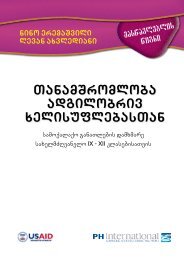The Geneva Protocol, by David Hunter Miller
The Geneva Protocol, by David Hunter Miller
The Geneva Protocol, by David Hunter Miller
You also want an ePaper? Increase the reach of your titles
YUMPU automatically turns print PDFs into web optimized ePapers that Google loves.
CHAPTER VIII. 33<br />
CHAPTER VIII.<br />
DOMESTIC QUESTIONS.<br />
<strong>The</strong> treatment in the <strong>Protocol</strong> of so-called domestic questions aroused a great deal of discussion not only at the<br />
Assembly, last September, but since the adoption there of the text.<br />
It may be remembered that there was a similar public discussion at the time of the drafting of the Covenant; in<br />
that document[1] a domestic question is defined as "a matter which <strong>by</strong> international law is solely within the<br />
domestic jurisdiction" of a State.<br />
Among instances of domestic questions which have been mentioned from time to time, perhaps the two most<br />
commonly referred to in this country are the tariff and immigration. Of course it has been pointed out very<br />
often that even such questions as these, however inherently domestic, may become international as soon as<br />
they are made the subject of a treaty, as they so frequently are. It should be added that almost any question, no<br />
matter how "domestic" in its nature originally, may become the subject of international cognizance <strong>by</strong> virtue<br />
of a treaty. <strong>The</strong>re are many treaties of the United States which have related to such questions as the<br />
inheritance of land, the right to administer the estates of decedents, etc.; a very recent instance is a treaty<br />
between this country and Canada regarding the protection of migratory birds, a treaty which has been upheld<br />
as valid <strong>by</strong> the Supreme Court.[2]<br />
None the less, the absolute right of a country to regulate these matters in its own discretion must be<br />
recognized as a matter of strict law. Any country, in the absence of treaty, may, at its pleasure, exclude<br />
foreigners from entering into its territory, for example. I think no one questions this.[3]<br />
However, as a matter of fact and as a result of the development of the world's commerce, there is hardly any<br />
such question which remains exclusively domestic. For example, even in our {47} drastic Immigration Law of<br />
1924,[4] there are various treaty rights of entry into the country for the purposes of commerce and so on<br />
which are expressly and in terms saved <strong>by</strong> the statute. Furthermore, there is, I suppose, hardly a country in the<br />
world which does not have various most-favored-nation treaties which directly affect tariffs.<br />
Again, modern developments necessitate the extension of international discussions and agreements to matters<br />
previously undreamed of; the erection of wireless stations near frontiers is a very practical instance; there<br />
must be some kind of agreement to prevent jamming in the air. <strong>The</strong> negotiations about the opium traffic have<br />
gone to the length of discussions as to what areas in certain regions should be planted with the poppy; a more<br />
essentially domestic question than the crops to be grown within a country could hardly be imagined.<br />
In my opinion, the <strong>Protocol</strong> follows the Covenant in its treatment of these domestic questions and goes no<br />
farther. <strong>The</strong> Covenant provides that if, upon reference to the Council, it is found that a dispute arises "out of a<br />
matter which <strong>by</strong> international law is solely within the domestic jurisdiction," the Council shall report to that<br />
effect and shall not even make a recommendation as to its settlement (Article 15, paragraph 8). In practice the<br />
Council will doubtless refer this question of law to the Permanent Court for an advisory opinion.[5]<br />
<strong>The</strong> <strong>Protocol</strong> (Article 5, paragraphs 1 and 2) continues this provision and applies it also to any arbitration<br />
which takes place <strong>by</strong> its terms. It is provided that if one of the parties to the dispute claims that the dispute "or<br />
part thereof" arises out of a domestic question, the arbitrators must take the advice of the Permanent Court on<br />
the point. <strong>The</strong> opinion of the Permanent Court is binding on the arbitrators and if the Court holds that the<br />
matter is "domestic," the power of the arbitrators to decide {48} the question is at an end and they are<br />
confined merely to recording the Court's opinion.<br />
<strong>The</strong> further provision of Article 5 on this question is the last paragraph of that Article, which reads as<br />
follows:[6]
















